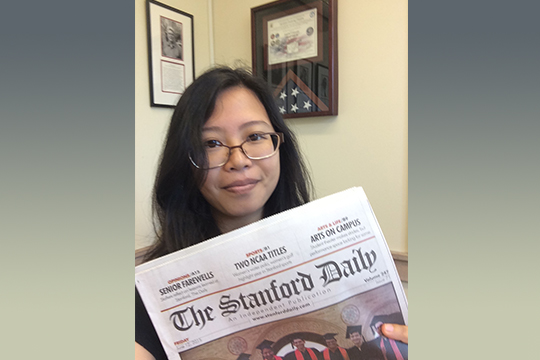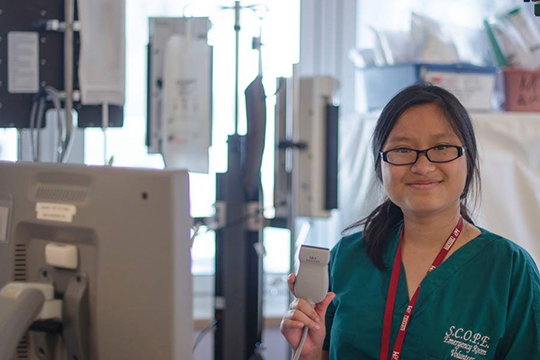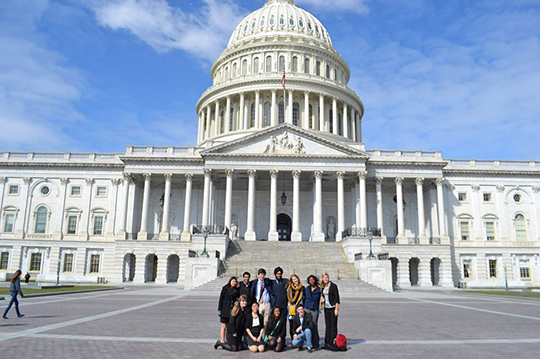Tag: Stanford University

A home for conversation
By Catherine Zaw, ’15 (Biology, Linguistics)
When I signed up to volunteer for a homeless women’s shelter in the winter of 2013, I anticipated physical work moving mattresses and sleepless nights worrying about the safety of the shelter. What I didn’t expect was the bonds I would form with some of the residents.
Annie had been a waitress in a traditional Italian restaurant before it was replaced by a fast food chain. “I can name all the types of pasta,” she told me. She drew pasta shapes on a scrap of napkin. “The conchiglie is my favorite. It’s like a conch shell. My grandmother used to make it all the time.”
Annie taught me everything she knew after a lifetime working with pasta. In turn, I told her about how the words macaroni, macaroon, and macaron have the same etymological heritage, but are completely different foods now. We traded knowledge and life experiences, and after a whole winter, I was sad to see our shelter time come to an end.
Annie wasn’t the only woman with a story at the shelter. Each visitor came in with her own experience, and the lesson I took was that there is a story in everyone, everything—and that all of these stories are important.

Bridging the gap between patient and provider
By Van Tran, ’16 (English)
Not many people can say they’ve had the chance to meet a survivor of human trafficking and domestic violence. I still remember the day the paramedics brought Quy* into the emergency room. Her head was tender from where it been bashed, the skin around one eye an angry red that slowly bruised purple. But what I remember most is the blank look in her eyes as the staff at Santa Clara Valley Medical Center (SCVMC) tried to figure out what language she spoke.
Our hospital doesn’t have in-house interpreters on weekend or overnight shifts. That’s where I come in as a volunteer interpreter from SCOPE, a hospital nonprofit that connects Stanford students with opportunities for public service. On some days, I’m the only Vietnamese speaker in the emergency department. By bridging linguistic and cultural barriers, I facilitate healthcare delivery for patients like Quy.
In my three years with SCOPE, I have been blessed with the opportunity to share in the experience of SCVMC patients, many of whom come from underserved communities. In the process of working with these patients to convey their story, I discover new facets of my cultural heritage and emerge reinvigorated in my dedication to public service.
*Alias used to protect patient’s privacy.

Lobbying for human rights
By Jared Naimark, ’14 (Earth Systems)
In 2013, I led an Alternative Spring Break (ASB) trip to Washington D.C. After teaching a 10-week course to 12 fellow undergraduates on international human rights advocacy with my co-leader Emily Witt, we set off for a week-long exploration of our nation’s capital. We met with eight different nonprofit advocacy organizations and one government agency and engaged their staff in provocative discussions centered around the question: How can we get more people to care about international human rights and take action without oversimplifying the causes of or solutions to violent conflict?
With these discussions in mind, our group set off for Capitol Hill. We were nervous and tired, and most of us had never been in a lobby meeting before. But we put on our best clothes, reviewed our notes, and stepped into the congressional offices with confidence. We asked for the US to cut military aid to Rwanda which had been supporting abusive insurgent groups in Eastern Congo, and also asked for human rights benchmarks to be met before the US resumed military to military relations with Burma’s armed forces. After these lobby meetings, our trip was over, but our group’s commitment to transforming human rights advocacy was just beginning. Empowered by the notion that elected officials would actually care what a group of college students thought about human rights, our group was inspired to take what we learned on our trip and apply it to a diverse range of public service causes and pathways.
